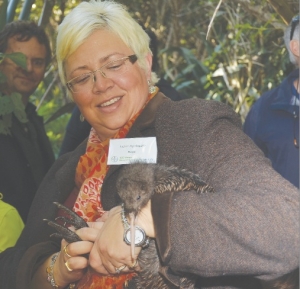About 12 products for the dairy industry are developed each year in New Zealand and registered for sale by Bayer in the global market. This is an impressive contribution given Bayer is a $60 billion global giant operating in 100 countries with strong global innovation centres.
Applegate, who has been in the Australasian position about three months, was in New Zealand for the first time last month for the release of two rare brown kiwi on predator-free Motutapu Island out from Auckland. “The mission for our company is about science for a better life and it’s about improving the quality of life of people, plants and animals. In honour of our 150 year celebration we’ve chosen to further establish our conservation efforts in the communities within which we live,” she told those gathered for the kiwi release.
Bayers is giving $25,000 this year to the Motutapu Restoration Trust and has committed to replanting 2.5ha of the island in native bush. It is also working with Nature Recovery Centre in Whangarei which has an incubation centre for kiwis. Bayer is also working with the New Zealand Royal Society on funding environmental science projects for primary and secondary students and awarding scholarships to secondary graduates.
Applegate is chief executive of the three divisions of the company in Australia and New Zealand: health care, animal science and crop science. She is also managing director of Bayer Crop Science for Australia and New Zealand.
Applegate says there’s a need to globally boost production in crops, dairy and meat with the macro-economic trends of growing population and the need for more food.
“The relevance of agriculture long term is extremely important,” she says. “Bayer needs to serve the backbone of the country which is the farmer and ensure they are going to be successful. We want to grow the business and want year on year double digit growth.”
Bayers’ business in New Zealand in crop science alone is worth $30m annually and from the agricultural perspective in Australia is greater than $200 million annually.
Innovative work on mastitis has been driven from the company’s New Zealand research division based on teat sealants that prevent contaminants entering. A pipeline of about 80 products on average are under research in New Zealand, with about 12 registered for the global market each year.
Applegate says although Bayer has strong global innovations centres they also invest locally: in February they invested in a $14m wheat and oil breeding centre in Victoria. They are investing heavily in animal health for the China market, and a recent biological acquisition is looking overseas at treatments for kiwifruit vine disease Psa.

















